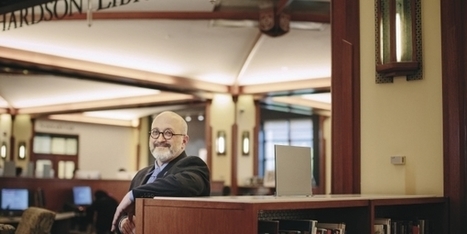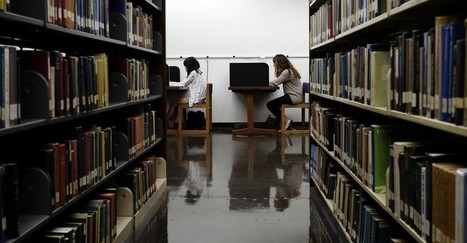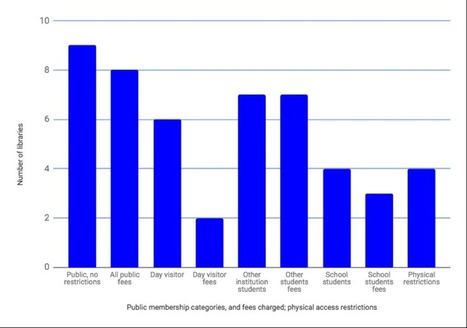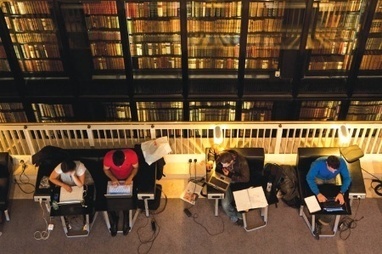 Your new post is loading...
 Your new post is loading...
Christopher Cox predicts the significant ways academic libraries will shift in terms of collections, services, spaces and operations as a result of the pandemic. In early March 2020, COVID-19 blindsided academic libraries. With little time to plan, we closed our library facilities at Clemson University to protect the safety of our patrons and employees and moved to online services only and work from home. Thankfully, years of curating digital content, providing multiple opportunities for research interaction and developing robust search interfaces and web presences served us well during this transition.
Via Elizabeth E Charles
Virginia Wesleyan University (VWU) is ranked 19th in ethnic diversity among national liberal arts colleges by U.S. News & World Report, a distinction held high by the institution. Diversity is a prominent feature of VWU’s strategic plan, and the institution’s core values emphasize inclusion and social responsibility. Given the diverse constituents on campus, librarians at VWU’s Hofheimer Library saw an opportunity to develop library diversity initiatives in an intentional way. What’s more, diversity forms an important component of the library’s strategic plan, thus emphasizing a commitment inclusive of the community being served.
Via Elizabeth E Charles
Libraries and learning resources services have embraced digital practice over three decades. Lis Parcell reflects on their pioneering approach and considers how libraries will continue to reinvent themselves
Via Elizabeth E Charles
M.A.—$20,000 dollars of student debt, 14 months, one thesis, two internships, $1,500 dollars worth of textbooks, and countless sleepless nights later and I finally earned those two little letters following my name. It wasn’t until three semesters into my degree, after spending $1,000 dollars merely renting my textbooks that I discovered my University’s ebook library. To be clear, I didn’t just stumble upon it either. After learning about open educational resources (OER) at the HEeD Think Tank last spring (now UPCEA’s eDesign Collaborative), I spent hours doing my own personal research on my university’s open access policy and scouring the library website. Eventually, I was able to find all but three of my 11 textbooks for my master’s degree in educational technology freely available on the library website, not to mention plenty of other materials (e.g., case studies and articles I had purchased over the years).
Via Elizabeth E Charles
Academic librarians cannot escape the implications of the knowledge economy and the pervasion of technology which effects everything that we do. Similarly, we must be prepared to teach our students how to cope in this knowledge society and how to develop the necessary information and digital literacy skills to be productive members of society in a digital environment. This article explores the first eighteen months of our experience as digital curriculum librarians in a large project at the University of South Australia (UniSA), UniSA Online. We have taken this opportunity to critically reflect on being embedded librarians within such a strategic and unique project. We examine the key cultural, pedagogical and technological challenges we have faced in delivering resources, support and services to the project team.
Via Elizabeth E Charles
When DePaul University opened its new library in 1992, the information ecosystem was on the precipice of change. The internet was becoming mainstream and, with it, libraries’ role in providing access to information was crumbling.
Via Elizabeth E Charles, Ivon Prefontaine, PhD
In August 2016 I was asked to lead a project into the development and implementation of a ‘Feedback Wall’ - a board in the entrance to the library that is there for our users to write their comments/thoughts/queries to us on and, in turn, for us to respond to them however we see fit. Here’s a rundown of the whys and wherefores of the project and where we’re at now.
Via Elizabeth E Charles
Smartphones Can't Replace Libraries
In an Instagram video, former Fox News host Greta Van Susteren proclaimed that she is “scandalized” by the cost of education and how college students are saddled with “gigantic student loans.”
Viewers may well have been nodding in agreement at that point in the video. And if they heard last month’s NPR program on how more colleges are opening food pantries, it makes sense to many to say that higher education is too expensive for students, their parents and families -- both while students are enrolled in college and afterward, and whether a degree is earned or not.
Via Elizabeth E Charles
|
Abstract
This article summarizes trending topics in academic librarianship from the past two years. These highlights provide a starting point or an update, depending on one’s familiarity with the topic. Overarching themes across the profession continue to emphasize the significant amount of change our institutions are driving, managing, and navigating.
Via Elizabeth E Charles
One of the most sought after skills in innovation industries is curiosity. The brilliant thing about curiosity is anybody is capable of it. It does not require intelligent genes or an expensive education. The only requirement is a willingness to try something new. Trying new things is how we advance our disciplines, so curiosity is key to any innovative field. Not surprisingly, curiosity often manifests in experimentation because experimentation, at its core, is about trying new things.
Via Elizabeth E Charles
Download rates of academic journals have joined citation counts as commonly used indicators of the value of journal subscriptions. While citations reflect worldwide influence, the value of a journal subscription to a single library is more reliably measured by the rate at which it is downloaded by local users. If reported download rates accurately measure local usage, there is a strong case for using them to compare the cost-effectiveness of journal subscriptions. We examine data for nearly 8,000 journals downloaded at the ten universities in the University of California system during a period of six years. We find that controlling for number of articles, publisher, and year of download, the ratio of downloads to citations differs substantially among academic disciplines. After adding academic disciplines to the control variables, there remain substantial “publisher effects”, with some publishers reporting significantly more downloads than would be predicted by the characteristics of their journals. These cross-publisher differences suggest that the currently available download statistics, which are supplied by publishers, are not sufficiently reliable to allow libraries to make subscription decisions based on price and reported downloads, at least without making an adjustment for publisher effects in download reports.
Via Elizabeth E Charles
Libraries and funding agencies are finally flexing their muscles against journal paywalls. Authors should follow suit. A PERSON COULD BE FORGIVEN for believing 20 years ago that the internet would soon revolutionize academic publishing. With the emergence of the world wide web, it suddenly became possible for academic publishers to disseminate scholarly work at the click of a button — at a fraction of the cost of printing and mailing hard-copy journals. Recognizing the opportunity, many scholars and librarians began to advocate a new, open access model of academic publishing, in which research articles are made freely available online to anyone who wants them, not just affiliates of colleges or universities. The result would be a true online “public library of science” — which, as it so happens, also became the name of one of the first publishers to embrace the model. As a new librarian in the early 2000s, I believed passionately in the cause of open access and worked hard to bring it about. But almost two decades later, the movement has made only slight gains at the margins, and the traditional subscription-based model remains firmly entrenched in academia. For the university libraries who bear most of the subscription costs, it is as though the internet revolution never happened: Since 1986, research library expenditures have grown at more than four times the rate of inflation, with journal prices showing the greatest price jumps of all.
Via Elizabeth E Charles
Introduction. Open access to digital research output is increasing, but academic library policies can place restrictions on public access to libraries. This paper reports on a preliminary study to investigate the correlation between academic library access policies and institutional positions of openness to knowledge.
Method. This primarily qualitative study used document and data analysis to examine the content of library access or use policies of twelve academic institutions in eight countries. The outcomes were statistically correlated with institutional open access publication policies and practices.
Analysis. We used an automated search tool together with manual searching to retrieve Web-based library access policies, then categorised and counted the levels and conditions of public access. We compared scores for institutional library access feature with open access features and percentages of open access publications.
Results. Academic library policies may suggest open public access but multi-layered user categories, privileges and fees charged can inhibit such access, with disparities in openness emerging between library policies and institutional open access policies.
Conclusion. As open access publishing options and mandates expand, physical entry and access to print and electronic resources in academic libraries is contracting. This conflicts with global library and information commitments to open access to knowledge.
Via Elizabeth E Charles
Spreading digital fluency is now a core responsibility of academic libraries, and Artificial Intelligence and the Internet of Things (IoT) are poised to amplify the utility and reach of library services like never before. These are just two of the revelations part of the New Media Consortium’s (NMC) University of Applied Sciences (HTW) Chur, Technische Informationsbibliothek (TIB), ETH Library, and the Association of College & Research Libraries’ (ACRL) Annual Horizon Report: 2017 Library Edition.
Via Elizabeth E Charles, Dean J. Fusto
The concept of making college more accessible and affordable with open educational resources is taking off on campuses across the country. SPARC hosted a webcast on March 29 that featured four librarians who shared their experience in supporting OER in creative ways with students,faculty, and community members.
Via Elizabeth E Charles
Speaking at the Educause Annual Conference last month, Chris Bourg, director of libraries at the Massachusetts Institute of Technology, said something that seemed to resonate with her audience.
“I don’t think we need to save libraries, but I do think we might need libraries to save us,” Bourg said.
Via Elizabeth E Charles
Britain’s research libraries can do far more to help their “unique” collections serve the needs of scholars, their universities and communities
Via Elizabeth E Charles
|



 Your new post is loading...
Your new post is loading...























A great overivew of current state of play in academic libraries and the LIS sector, with a call to start implementing changes. If not now - when?